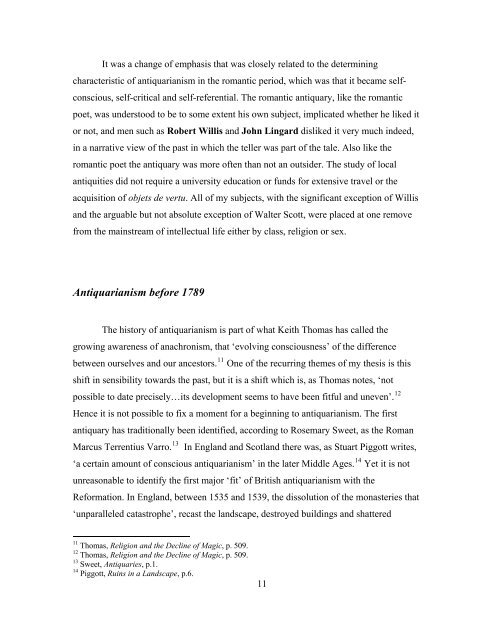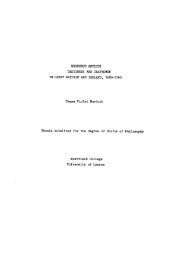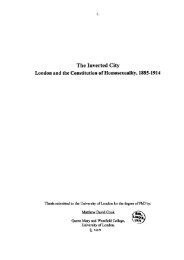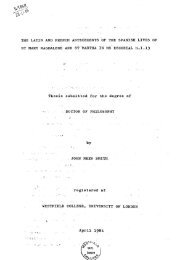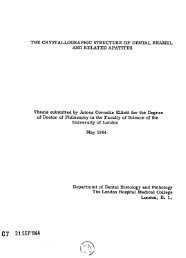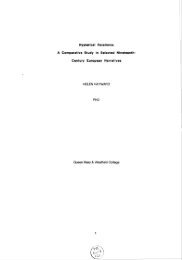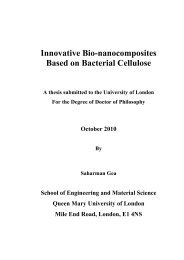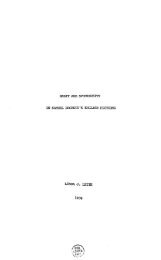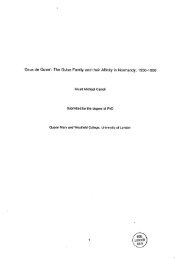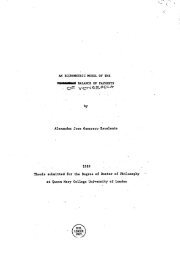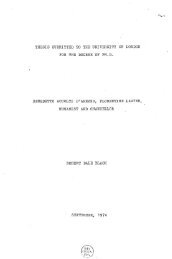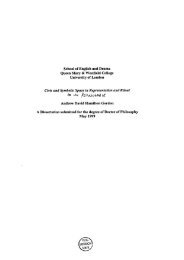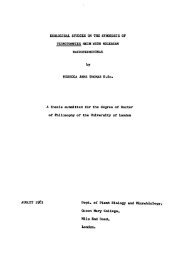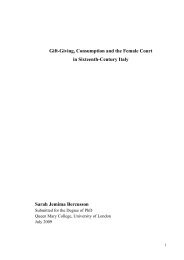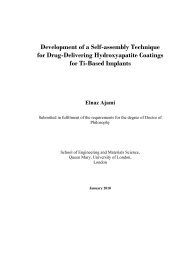Antiquaries in the Age of Romanticism: 1789-1851 - Queen Mary ...
Antiquaries in the Age of Romanticism: 1789-1851 - Queen Mary ...
Antiquaries in the Age of Romanticism: 1789-1851 - Queen Mary ...
You also want an ePaper? Increase the reach of your titles
YUMPU automatically turns print PDFs into web optimized ePapers that Google loves.
It was a change <strong>of</strong> emphasis that was closely related to <strong>the</strong> determ<strong>in</strong><strong>in</strong>g<br />
characteristic <strong>of</strong> antiquarianism <strong>in</strong> <strong>the</strong> romantic period, which was that it became self-<br />
conscious, self-critical and self-referential. The romantic antiquary, like <strong>the</strong> romantic<br />
poet, was understood to be to some extent his own subject, implicated whe<strong>the</strong>r he liked it<br />
or not, and men such as Robert Willis and John L<strong>in</strong>gard disliked it very much <strong>in</strong>deed,<br />
<strong>in</strong> a narrative view <strong>of</strong> <strong>the</strong> past <strong>in</strong> which <strong>the</strong> teller was part <strong>of</strong> <strong>the</strong> tale. Also like <strong>the</strong><br />
romantic poet <strong>the</strong> antiquary was more <strong>of</strong>ten than not an outsider. The study <strong>of</strong> local<br />
antiquities did not require a university education or funds for extensive travel or <strong>the</strong><br />
acquisition <strong>of</strong> objets de vertu. All <strong>of</strong> my subjects, with <strong>the</strong> significant exception <strong>of</strong> Willis<br />
and <strong>the</strong> arguable but not absolute exception <strong>of</strong> Walter Scott, were placed at one remove<br />
from <strong>the</strong> ma<strong>in</strong>stream <strong>of</strong> <strong>in</strong>tellectual life ei<strong>the</strong>r by class, religion or sex.<br />
Antiquarianism before <strong>1789</strong><br />
The history <strong>of</strong> antiquarianism is part <strong>of</strong> what Keith Thomas has called <strong>the</strong><br />
grow<strong>in</strong>g awareness <strong>of</strong> anachronism, that ‘evolv<strong>in</strong>g consciousness’ <strong>of</strong> <strong>the</strong> difference<br />
between ourselves and our ancestors. 11 One <strong>of</strong> <strong>the</strong> recurr<strong>in</strong>g <strong>the</strong>mes <strong>of</strong> my <strong>the</strong>sis is this<br />
shift <strong>in</strong> sensibility towards <strong>the</strong> past, but it is a shift which is, as Thomas notes, ‘not<br />
possible to date precisely…its development seems to have been fitful and uneven’. 12<br />
Hence it is not possible to fix a moment for a beg<strong>in</strong>n<strong>in</strong>g to antiquarianism. The first<br />
antiquary has traditionally been identified, accord<strong>in</strong>g to Rosemary Sweet, as <strong>the</strong> Roman<br />
Marcus Terrentius Varro. 13 In England and Scotland <strong>the</strong>re was, as Stuart Piggott writes,<br />
‘a certa<strong>in</strong> amount <strong>of</strong> conscious antiquarianism’ <strong>in</strong> <strong>the</strong> later Middle <strong>Age</strong>s. 14 Yet it is not<br />
unreasonable to identify <strong>the</strong> first major ‘fit’ <strong>of</strong> British antiquarianism with <strong>the</strong><br />
Reformation. In England, between 1535 and 1539, <strong>the</strong> dissolution <strong>of</strong> <strong>the</strong> monasteries that<br />
‘unparalleled catastrophe’, recast <strong>the</strong> landscape, destroyed build<strong>in</strong>gs and shattered<br />
11 Thomas, Religion and <strong>the</strong> Decl<strong>in</strong>e <strong>of</strong> Magic, p. 509.<br />
12 Thomas, Religion and <strong>the</strong> Decl<strong>in</strong>e <strong>of</strong> Magic, p. 509.<br />
13 Sweet, <strong>Antiquaries</strong>, p.1.<br />
14 Piggott, Ru<strong>in</strong>s <strong>in</strong> a Landscape, p.6.<br />
11


